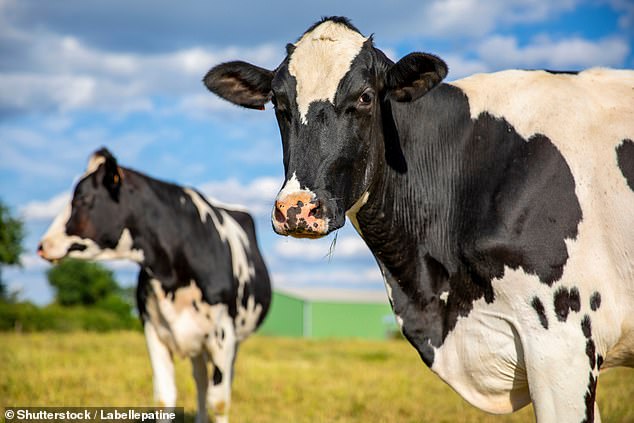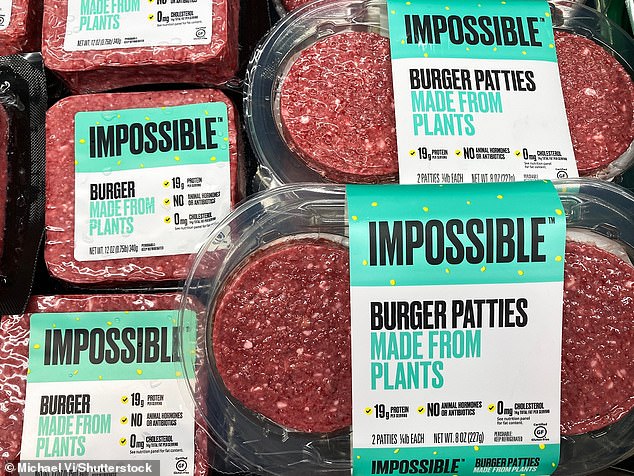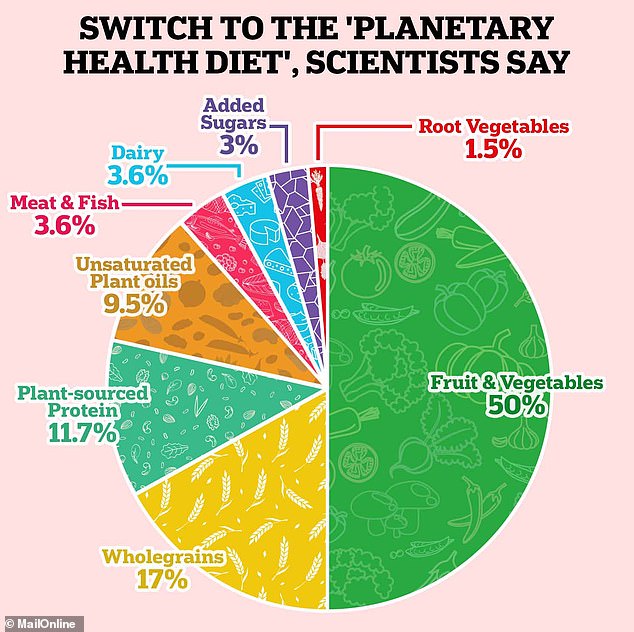By XANTHA LEATHAM, EXECUTIVE SCIENCE EDITOR
Published: | Updated:
Whether you have yours with pickles, extra cheese or covered in sauce, a burger can be one of the most satisfying meals to tuck into.
But people should limit their intake to one every two weeks to help curb climate change, according to an expert.
Paul Behrens, a British Academy Global Professor at the University of Oxford, claims Brits must cut down on their meat and dairy intake to help save the planet.
He argued that long–term climate change could make it impossible to grow food in a third of current production areas.
‘A shift to plant–rich diets in the UK would free an area almost the size of Scotland,’ he wrote on The Conversation.
Those who love chicken, pork and beef shouldn’t worry though – as they’d still be able to enjoy their favourite meals.
‘It’s not even vegetarian, although it does include a reasonable – and healthier – amount of meat and dairy,’ he said.
‘For example, it still includes a hamburger every fortnight.’


Professor Behrens explained that a shift to plant–rich diets would provide more space to grow crops and help curb rising food prices.
He cited research by agricultural economists that found a third of UK food price increases in 2023 resulted from climate change.
Other studies also predict significant food price increases every year in the coming decade.
Consistent stress on the food system could even cause collapse, according to some experts, prompting civil unrest and riots.
‘This trajectory of climate–driven food price hikes – leading to social unrest and political decay – is not inevitable,’ Professor Behrens added.
‘The scientific consensus shows that the biggest opportunity we have for reducing food’s environmental impacts across many countries is increasing the amount of plants we eat and reducing meat and dairy intake.’
A previous study, also carried out by academics at the University of Oxford, revealed that eating just 100g meat per day – less than a single burger – creates four times more greenhouse gases compared to a vegan diet.
‘Our dietary choices have a big impact on the planet,’ said lead author Peter Scarborough, professor of population health at Oxford’s Nuffield Department of Primary Care Health Sciences.


Why is meat bad for the planet?
Meat–heavy diets risk the health of our planet, as livestock farming on a massive scale destroys habitats and generates greenhouse gases.
Animal agriculture contributes to global warming because of the methane, nitrous oxide and carbon emissions of livestock and their supply chains.
The clearing of trees to make way for grazing cattle also reduces carbon sequestration – the process of capturing and storing atmospheric carbon dioxide.
‘Our results, which use data from over 38,000 farms in over 100 countries, show that high meat diets have the biggest impact for many important environmental indicators, including climate change and biodiversity loss.
‘Cutting down the amount of meat and dairy in your diet can make a big difference to your dietary footprint.’
Earlier this year, scientists claimed that Brits will need to curb their meat consumption if the government is to meet its net zero targets.
The government’s climate advisers said that the average amount of meat eaten by Brits each week equates to roughly eight kebabs, but that this needs to be reduced by a quarter to help meet emissions targets.
They also suggested that Brits reduce their dairy consumption by 20 per cent by 2040.
Labour’s Climate Change Committee said this would allow for farmland to be freed up for increased tree planting to absorb carbon at greater rates.
Separately, a report compiled by HelloFresh predicted that Brits will soon be eating the likes of kelp noodle stir fry, soybean spaghetti and dandelion salad in the fight against climate change.
All dishes are free from any meat and very little cheese, which studies show are a big drivers of greenhouse gas emissions like carbon dioxide and methane.

Meanwhile, a study published in 2022 suggested that a total elimination of meat production around the world by 2037 could slash global emissions by 68 per cent and save Earth from climate change.
Researchers performed computer modelling scenarios of future greenhouse gas emissions up to the 22nd century using publicly available data from the UN.
Eliminating all animal agriculture in the next 15 years would drastically reduce greenhouse gas emissions and pull carbon dioxide from the atmosphere, they found.
Animal agriculture contributes to global warming because of the methane, nitrous oxide and carbon emissions of livestock and their supply chains.
THE ENVIRONMENTAL IMPACT OF FARMING COWS
The livestock animals are notorious for creating large amounts of methane, which is a major contributor to global warming.
Each of the farm animals produces the equivalent of three tonnes of carbon dioxide per year and the amount of the animals is increasing with the growing need to feed a booming population.
Methane is one of the most potent greenhouse gases, trapping 30 times more heat than the same amount of carbon dioxide.
Scientists are investigating how feeding them various diets can make cattle more climate-friendly.
They believe feeding seaweed to dairy cows may help and are also using a herb-rich foodstuff called the Lindhof sample.
Researchers found a cow’s methane emissions were reduced by more than 30 per cent when they ate ocean algae.
In research conducted by the University of California, in August, small amounts of it were mixed into the animals’ feed and sweetened with molasses to disguise the salty taste.
As a result, methane emissions dropped by almost a third.
‘I was extremely surprised when I saw the results,’ said Professor Ermias Kebreab, the animal scientist who led the study.
‘I wasn’t expecting it to be that dramatic with a small amount of seaweed.’
The team now plans to conduct a further six-month study of a seaweed-infused diet in beef cattle, starting this month.








